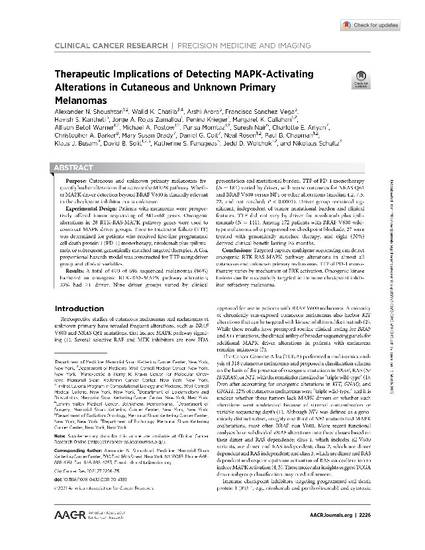
PURPOSE: Cutaneous and unknown primary melanomas frequently harbor alterations that activate the MAPK pathway. Whether MAPK driver detection beyond BRAF V600 is clinically relevant in the checkpoint inhibitor era is unknown.
EXPERIMENTAL DESIGN: Patients with melanoma were prospectively offered tumor sequencing of 341-468 genes. Oncogenic alterations in 28 RTK-RAS-MAPK pathway genes were used to construct MAPK driver groups. Time to treatment failure (TTF) was determined for patients who received first-line programmed cell death protein 1 (PD-1) monotherapy, nivolumab plus ipilimumab, or subsequent genomically matched targeted therapies. A Cox proportional hazards model was constructed for TTF using driver group and clinical variables.
RESULTS: A total of 670 of 696 sequenced melanomas (96%) harbored an oncogenic RTK-RAS-MAPK pathway alteration; 33% had ≥1 driver. Nine driver groups varied by clinical presentation and mutational burden. TTF of PD-1 monotherapy (
CONCLUSIONS: Targeted capture multigene sequencing can detect oncogenic RTK-RAS-MAPK pathway alterations in almost all cutaneous and unknown primary melanomas. TTF of PD-1 monotherapy varies by mechanism of ERK activation. Oncogenic kinase fusions can be successfully targeted in immune checkpoint inhibitor-refractory melanoma.
Shoushtari, A. N., Chatila, W. K., Arora, A., Sanchez-Vega, F., Kantheti, H. S., Rojas Zamalloa, J. A., Krieger, P., Callahan, M. K., Betof Warner, A., Postow, M. A., Momtaz, P., Nair, S., Ariyan, C. E., Barker, C. A., Brady, M. S., Coit, D. G., Rosen, N., Chapman, P. B., Busam, K. J., Solit, D. B., … Schultz, N. (2021). Therapeutic Implications of Detecting MAPK-Activating Alterations in Cutaneous and Unknown Primary Melanomas. Clinical cancer research : an official journal of the American Association for Cancer Research, 27(8), 2226–2235. https://doi.org/10.1158/1078-0432.CCR-20-4189
